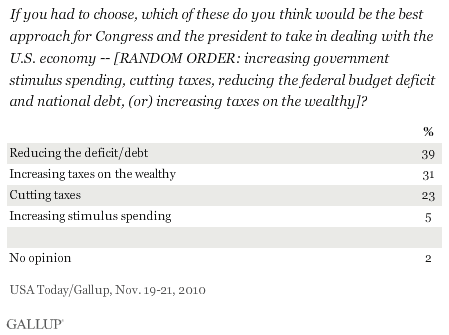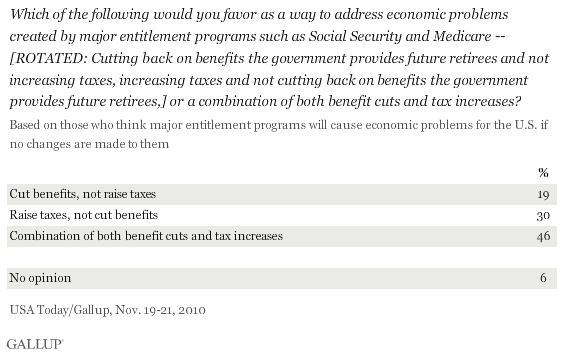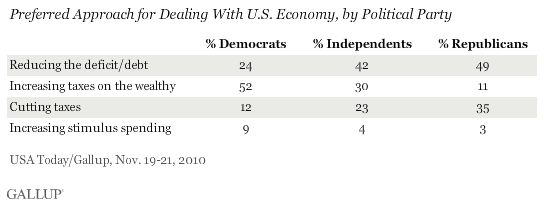PRINCETON, NJ -- Americans are most likely to choose deficit and debt reduction as the best approach for dealing with the economy over three widely discussed alternatives: raising taxes on the wealthy, cutting taxes, and increasing stimulus spending.

These results are based on a USA Today/Gallup poll conducted Nov. 19-21 as the U.S. economy continues to suffer from sluggish growth and high unemployment. Americans do not show a strong consensus for any of the approaches, but clearly reject additional economic stimulus spending. The increased government spending in late 2008/early 2009 to bail out major U.S. corporations and attempt to jump-start the economy concerned many Americans and helped fuel the Tea Party movement, leading to significant Democratic losses in Congress in the midterm elections. That concern is also reflected in Americans' endorsing deficit reduction as an economic strategy over generally popular approaches like tax cuts or tax hikes on the wealthy.
Both independents and Republicans choose deficit reduction as the preferred economic approach. Republicans even choose it over tax cuts, a core Republican Party goal, by a 14-point margin. Democrats are less inclined to back deficit reduction, with a majority instead choosing to increase taxes on the wealthy.
President Obama, who has received low scores from the public for his handling of the federal budget deficit since last summer, made deficit reduction a priority earlier this year by establishing a bipartisan commission on reducing the deficit and national debt. The commission's report is due in December, but a draft of the report has already outlined some of the commission's proposed solutions, including changes to the major entitlement programs such as Social Security and Medicare that make up a large part of the budget each year.
Gallup finds 75% of Americans saying that failing to address the costs of those programs would create major economic problems for the U.S. in the next 25 years. Among this group, more favor tax increases as the better solution than benefit cuts -- 30% vs. 19%; however, the largest segment, 46%, favors a combination of both.

Implications
Americans place a higher priority on deficit reduction than on changes to the tax structure or increasing government spending as a way to deal with the economy. Americans' concern about the deficit is also apparent in the higher percentage who mention it as the most important problem facing the country today, averaging 8% this year, compared with 5% in 2009 and 2% from 2001-2008. Additionally, Americans were most likely to perceive the deficit as the most important problem the country will face 25 years from now.
However, Americans in the past have not embraced some of the tough approaches the deficit commission is calling for, such as cutting Social Security benefits, raising the Social Security retirement age, and eliminating the mortgage interest tax deduction. Indeed, even members of the president's deficit commission do not agree on some of its likely proposals, and it is not clear the commission will have the supermajority needed to prompt congressional action on its recommendations.
Survey Methods
Results for this USA Today/Gallup poll are based on telephone interviews conducted Nov. 19-21, 2010, with a random sample of 1,037 adults, aged 18 and older, living in the continental U.S., selected using random-digit-dial sampling.
For results based on the total sample of national adults, one can say with 95% confidence that the maximum margin of sampling error is ±4 percentage points.
Interviews are conducted with respondents on landline telephones (for respondents with a landline telephone) and cellular phones (for respondents who are cell phone-only). Each sample includes a minimum quota of 150 cell phone-only respondents and 850 landline respondents, with additional minimum quotas among landline respondents for gender within region. Landline respondents are chosen at random within each household on the basis of which member had the most recent birthday.
Samples are weighted by gender, age, race, education, region, and phone lines. Demographic weighting targets are based on the March 2009 Current Population Survey figures for the aged 18 and older non-institutionalized population living in continental U.S. telephone households. All reported margins of sampling error include the computed design effects for weighting and sample design.
In addition to sampling error, question wording and practical difficulties in conducting surveys can introduce error or bias into the findings of public opinion polls.
View methodology, full question results, and trend data.
For more details on Gallup's polling methodology, visit www.gallup.com.

